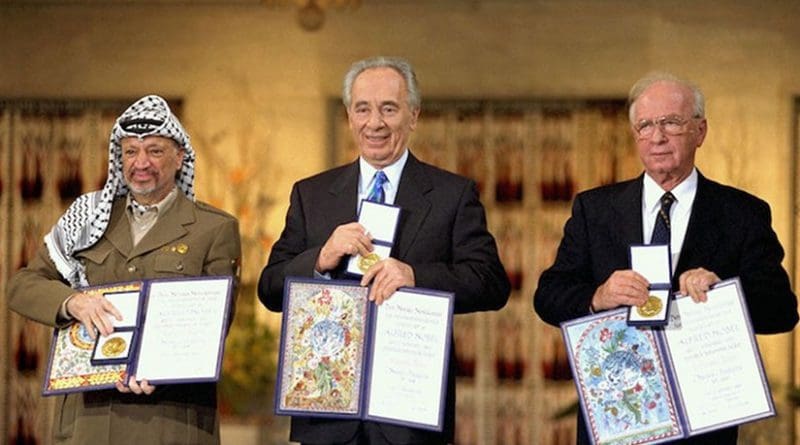Assessing Arafat’s Legacy, 15 Years After His Death – OpEd
By Ray Hanania
No individual sacrificed more, risked more or accomplished more for the just cause of the Palestinian people than Yasser Arafat, who died 15 years ago this week.
Arafat has been vilified by Israelis and Jews for good reason: He took Golda Meir’s racist quote that said the Palestinians “did not exist” and proved them morally, ethically and legally wrong.
He was the inspiration for millions of Palestinians, Arabs and Muslims as a person who stood up against overwhelming odds, a champion of freedom, an antagonist of oppression, and a role model for future generations. Arafat was a heroic freedom fighter and a martyr for his people who many, including myself, believe was murdered by order of Israeli war criminal Ariel Sharon.
Every Palestinian child, either in the Arab world, living under the brutal British Mandate or Israeli oppression, or surviving in the unfriendly world of the diaspora could find solace in the fact that Arafat’s name symbolized the struggle of the just against a more powerful evil.
The joint-founder of Fatah — an acronym for “Harakat Tahrir Filasteen” (Palestinian National Liberation Movement) — in 1958, Arafat was my personal inspiration. He understood the power of the news media and communications and launched a magazine advocating armed struggle against Israel’s murderous regime.
In 1969, Arafat took over the Palestine Liberation Organization (PLO), which was formed by the Arab world in 1964, and turned it into one of the most feared and revered revolutionary movements in the world. Under his leadership, the PLO reached out to bring together the complex web of Palestinian organizations both inside and outside of the Occupied Territories. He convinced the world that — despite the pernicious propaganda of the military state of Israel that portrayed the Palestinians as nonexistent terrorists with no rights — the Palestinian cause was one of the most just on the planet.
I witnessed in captivated inspiration the speech Arafat gave at the UN on Nov. 13, 1974 — 35 years ago this week — in which he exhorted Israel’s regime for sending numerous murder squads to kill him and his allies over the preceding years. He called on Israel to end its racism and embrace a “democratic Palestine.” It was a historic speech that every victim of injustice reveres and uses to seek inspiration for their own struggles for freedom.
Arafat taught the world that Palestinians had every right to use violence to fight for freedom against Israeli oppression, but that the door to peace could be opened simply by recognizing the principles of human rights and equality.
“Today I have come bearing an olive branch and a freedom fighter’s gun. Do not let the olive branch fall from my hand. I repeat: Do not let the olive branch fall from my hand,” Arafat told the UN General Assembly and the freedom-loving world. “War flares up in Palestine, and yet it is in Palestine that peace will be born.”
And Arafat delivered. In 1988, he began indirect negotiations with Israel, bringing an end to the violence of both sides. This gesture led to the signing of the Oslo I Accord, which I witnessed first-hand, on the lawn of the White House on Sept. 13, 1993. Arafat signed the Declaration of Principles that recognized Israel inside the 1967 borders in exchange for Palestinian self-government in the West Bank and Gaza. Arafat shook the hand of Israeli Prime Minister Yitzhak Rabin while the declarations were signed by Israeli Foreign Minister Shimon Peres and PLO Foreign Minister Mahmoud Abbas.
Arafat made the right choice to trust Rabin, who genuinely wanted to bring peace to his people and a future to the Palestinians. Together, they cleared the way for a brief period of genuine peace, but that was destroyed by an Israeli terrorist and disciple of Sharon, his former terrorist colleague Yitzhak Shamir, and their political understudy, Benjamin Netanyahu. Rabin was assassinated on Nov. 4, 1995, fracturing the peace and opening the door to the first election of Netanyahu as prime minister in June of 1996.
Several efforts were made to build on the Oslo Accords, including the 2000 Camp David summit between Arafat and Ehud Barak, who had succeeded Netanyahu in July 1999. However, the negotiations, which were led by US President Bill Clinton, collapsed. Barak blamed Arafat, while Arafat’s people blamed Barak. The Israelis falsely asserted that Barak offered Arafat everything, including a share of Jerusalem, compensation to refugees, and 90 percent of the West Bank. But none of the so-called peace gestures from Barak were ever formally written down. The peace offer became Israel’s propaganda lie to undermine the movement for peace based on compromise.
Barak’s failure to reach a new compromise with Arafat opened the door to a second opportunity for Israeli extremists to destroy the Rabin-Arafat peace. On Sept. 28, 2000, surrounded by hundreds of armed Israeli police, opposition leader Ariel Sharon entered Al-Haram Al Sharif and provoked a new conflict with the Palestinians, resulting in more bloodshed and even worse oppression.
Sharon sought to destroy the peace accords and humiliate Arafat, who he tried to have assassinated several times prior to the peace talks. In 2002, Sharon ordered Israel’s military to surround Arafat’s compound in Ramallah and not let him leave. Arafat became deathly ill while under Sharon’s total military control, raising suspicions that Sharon had finally achieved his goal of assassinating the Palestinian leader. Arafat was permitted to seek medical help in France, where he died on Nov. 11, 2004.
Arafat was a hero and role model whose legacy continues to remind us that the price of peace and justice for Palestine is steep, but it is a goal that is worth our collective sacrifice. Hopefully we may find a new Arafat to lead Palestinians through today’s difficult times.

